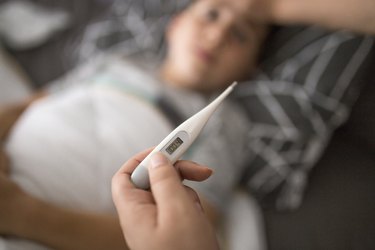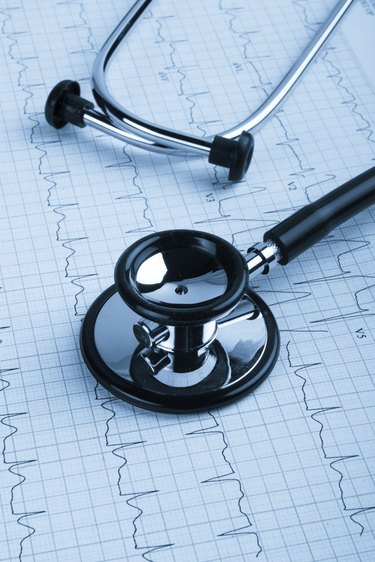
Dehydration and fever are two symptoms that often go hand in hand, especially when you're sick. But falling short on fluids alone won't always drive up your body temperature.
"Fever can be a symptom of dehydration, but it may not be a direct result of dehydration," says David Cutler, MD, a family medicine physician at Providence Saint John's Health Center in Santa Monica, California.
Video of the Day
Here's more about how these two problems are related, what causes them and how to treat them, including when it's time to seek medical attention.
Is Fever a Symptom of Dehydration?
A person can develop a fever when they're dehydrated. Being dehydrated doesn't always cause a fever. Often, fevers are the result of an underlying illness or infection, which can up the risk for becoming dehydrated.
Dehydration happens when the body loses too much water and electrolytes. That can affect various bodily functions, including the ability to maintain body temperature. It can also affect a person's blood pressure and heart rate, according to the University of Rochester Medical Center.
"The body relies on an adequate water balance to regulate its temperature through sweating and other cooling mechanisms," Dr. Cutler explains. "When dehydration occurs, the body may struggle to cool itself effectively, leading to an elevated body temperature."
That's particularly true for babies and young children, who will routinely run a high fever when they're dehydrated, per the National Library of Medicine.
Sometimes dehydration can lead to heat exhaustion, where the body overheats and can't cool down from being in very hot weather or during physical activity, per the Cleveland Clinic. When the body isn't able to cool itself effectively, a person will also typically run a fever of 100 degrees Fahrenheit or higher.
Other Symptoms of Dehydration
A fever isn't the only possible sign of dehydration. According to the National Library of Medicine, other symptoms can include:
- Feeling very thirsty
- Dry mouth
- Urinating and sweating less than usual
- Dark-colored urine
- Dry skin
- Feeling tired
- Dizziness
As dehydration becomes more severe, a person's symptoms will worsen and potentially become life-threatening. Signs of severe dehydration are:
- Confusion
- Fainting
- Lack of urination
- Rapid heartbeat
- Rapid breathing
- Shock
Dehydration symptoms for babies and young children aren't always the same as adults. An infant or small child is usually dehydrated if they:
- Have a dry mouth or tongue
- Cry without tears
- Have no wet diapers for 3 hours or longer
- Have a high fever
- Are unusually sleepy or drowsy
- Are irritable
- Have eyes that look sunken
Can a Fever Cause Dehydration?
Having a fever won't automatically cause a person to become dehydrated. But if your temperature is running above normal, dehydration is a possible side effect, Dr. Cutler explains.
Having a fever causes the body to sweat more, which can increase fluid loss. At the same time, a person may be less interested in eating or drinking, making it harder for them to replace the lost fluids and keep their levels balanced, says Dr. Cutler.
A fever can also cause a person to breathe faster and slightly increase their metabolism, also adding to fluid loss.
How to Treat a Fever From Dehydration
While it's possible for dehydration alone to cause an increase in body temperature (especially in babies and little kids), a fever is often the result of an underlying issue or infection. "When treating dehydration alongside a fever, it is important to address both the underlying cause of the fever and the fluid imbalance," Dr. Cutler says.
To address both problems, it's important to replace lost fluids and electrolytes while also helping a person stay comfortable. Here are some ways to do that:
- Drink more fluids. Water, oral rehydration solutions (like Pedialyte), diluted sports drinks or clear broths can all get the job done. "Start with small, frequent sips if large amounts are difficult to tolerate," Dr. Cutler recommends. (Steer clear of sugary or caffeinated drinks — they can make dehydration worse, especially if a person has diarrhea.) Oral rehydration solutions are a better choice for infants and children: Start by offering 1 teaspoon of fluid every five minutes, the Mayo Clinic recommends. If your baby isn't used to sipping from a spoon, use a syringe.
- Apply a cool compress. A damp washcloth placed on the forehead or used to "sponge" the body can help it cool down, Dr. Cutler says. Taking a lukewarm bath can help too.
- Consider meds for a high fever. Over-the-counter pain relievers like ibuprofen, aspirin or acetaminophen aren't necessary when you have a temperature, but they might help you feel better, notes the Cleveland Clinic. Avoid giving aspirin for fevers to children under 17, though, because it can trigger a potentially fatal illness called Reye's syndrome. And always follow the directions on the label when it comes to dosage.
Other Causes of Dehydration and Fever
Sometimes dehydration is the result of simply not drinking enough water, especially when a person is active or spends a long stretch of time outside on a hot, humid day.
But often, dehydration that comes with a fever means that a person has an underlying illness or infection. Not only can the fever itself increase the risk for dehydration, but a person who feels sick may not be eating or drinking as much and might also have diarrhea or vomiting, which can increase fluid loss even more.
According to Dr. Cutler, some of the most common culprits are:
- Flu
- Stomach bug (gastroenteritis)
- Urinary tract infections
- Pneumonia
- Meningitis (less often)
When to See a Doctor
Dehydration can become serious when a person isn't able to replace their lost fluids, especially if they're also running a fever. While mild dehydration can usually be treated at home, you should seek immediate medical attention if a person seems confused, faints, isn't urinating, has a rapid heartbeat or rapid breathing, or goes into shock, the National Library of Medicine recommends. The person may need intravenous (IV) fluids to treat the dehydration.
It's worth erring on the side of caution for babies, young children and older adults, who can become dehydrated more easily and may be more sensitive to the effects of lost fluids, notes the Mayo Clinic. If your child or an older adult has a fever and is dehydrated, consider calling their doctor. Together, you can talk about the person's symptoms and decide whether it's OK to treat the dehydration at home.
Is this an emergency? If you are experiencing serious medical symptoms, please see the National Library of Medicine’s list of signs you need emergency medical attention or call 911.


